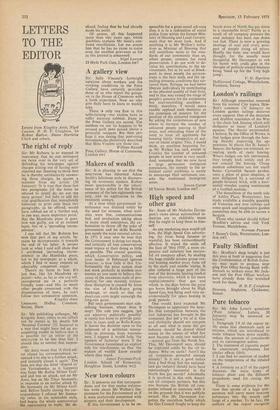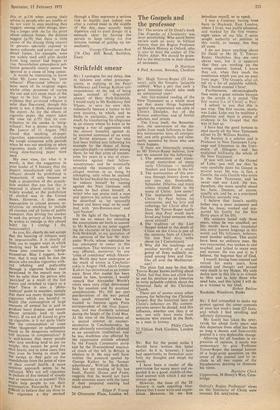Pure tobacco
Sir: Mr John Lowe's questions (`Pure tobacco', Letters, 30 January) may be answered as follows: 1. Paragraph 3.9 of the report (p. 38) states that chemicals such as nitrates, which are introduced to make tobacco burn more rapidly, reduce the amount of concentrate and its carcinogenic action.
2. The treatment of cigarette paper by ammonium sulphamatc has similar effects (ibid).
3. I can find no mention of studies on the temperature of the inhaled smoke.
4. A footnote on p.35 of the report discusses the main types of tobacco plant and the different procedures used for curing the leaf.
There is some evidence for the view that smoke of a high tem- perature will carry more noxious substances into the mouth and lungs of a smoker. To be fair, the authors of the report recognise this at p.134 when among their advice to people who are unable or do not want to stop smoking they suggest, among other things, leav- ing a longer stub. As for the point about exhaust fumes, the doctors suggest (p.58) that there is little excess of the disease (lung cancer) in persons specially exposed to motor exhausts, and point out that diesel fumes, for example, were not widely used until after deaths from lung cancer had begun to rise. Nevertheless atmospheric pol- lution generally clearly cannot be ignored as a cause of lung cancer. It would be interesting to know what Mr Lowe means by 'pure tobacco'. Flue-cured tobacco re- tains most of its original sugar, whilst other processes of curing (by sun and air) cause most of the sugar to be lost. There is some evidence that air-cured tobacco is safer than flue-cured, though this point is not, I think, discussed in the report. As for the effects of cigarette paper, the report takes the view (at p.35) that its con- tribution to the smoke is 'insig- nificant', but a doctor writing in the Lancet of 11 August 1962 found that smoking all-paper cigarettes approximately doubled his cough compared with periods when he was not smoking or when cigarettes made of tobacco and using slow-burning paper were used.
My own view, for what it is worth, is that the suggestion in your leader of 9 January that the import, manufacture and sale of tobacco should be prohibited is impractical, if only because so high a proportion of the popula- tion smokes that any law that is imposed is almost certain to be widely evaded, as the prohibition of alcohol was in the United States. However, it does seem appropriate to extend present re- strictions on smoking to include all cinemas and all forms of public transport, thus driving the smoker to seek the privacy of his home if he wishes to indulge in this absurd habit (as I confess I do, occasionally).
As you, Sir, clearly do not accept that the banning of tobacco may be impracticable, it is clearly of little use to suggest ways in which smoking may be made safer for those who continue to indulge themselves. May I suggest, how- ever, that it may well be that the person who smokes cigarettes with- out inhaling and preferably through a cigarette holder (not mentioned in the report) may in fact be safer than the person who panicked' as a result of the last report and switched to cigars or a Pipe? There is also a 'philo- sophical' point to consider, namely that there' are many things besides cigarettes which are harmful to health (the consumption of large amounts of animal fat is said to produce heart disease, and sweets almost certainly lead to tooth decay). If we are all forced to give op cigarettes, is it not quite likely that the -consumption of some other 'dangerous' or subsequently found to be dangerous substance will increase in compensation? It is well-known that many people who stop smoking tend to put on weight; this cannot be good for their hearts, and in some cases they may even be losing as much on the swings as they gain on the roundabouts from the point of view of their overall health. A more cautious approach seems to be indicated. Why not sell cigarettes in packets of five instead of simply tens or twenties as at present? This might help people to cut their consumption. Personally, I find it difficult to believe that say three to five cigarettes a day smoked
through a filter represent a serious risk to health; and indeed one after a rushed meal in the middle of the day may actually help digestion and so avert danger of a stomach ulcer by forcing the person to keep sitting for five minutes instead of getting up im- mediately.
George Chowdharay-Best 174 Clay Hill Road, Basildon, Essex



































 Previous page
Previous page